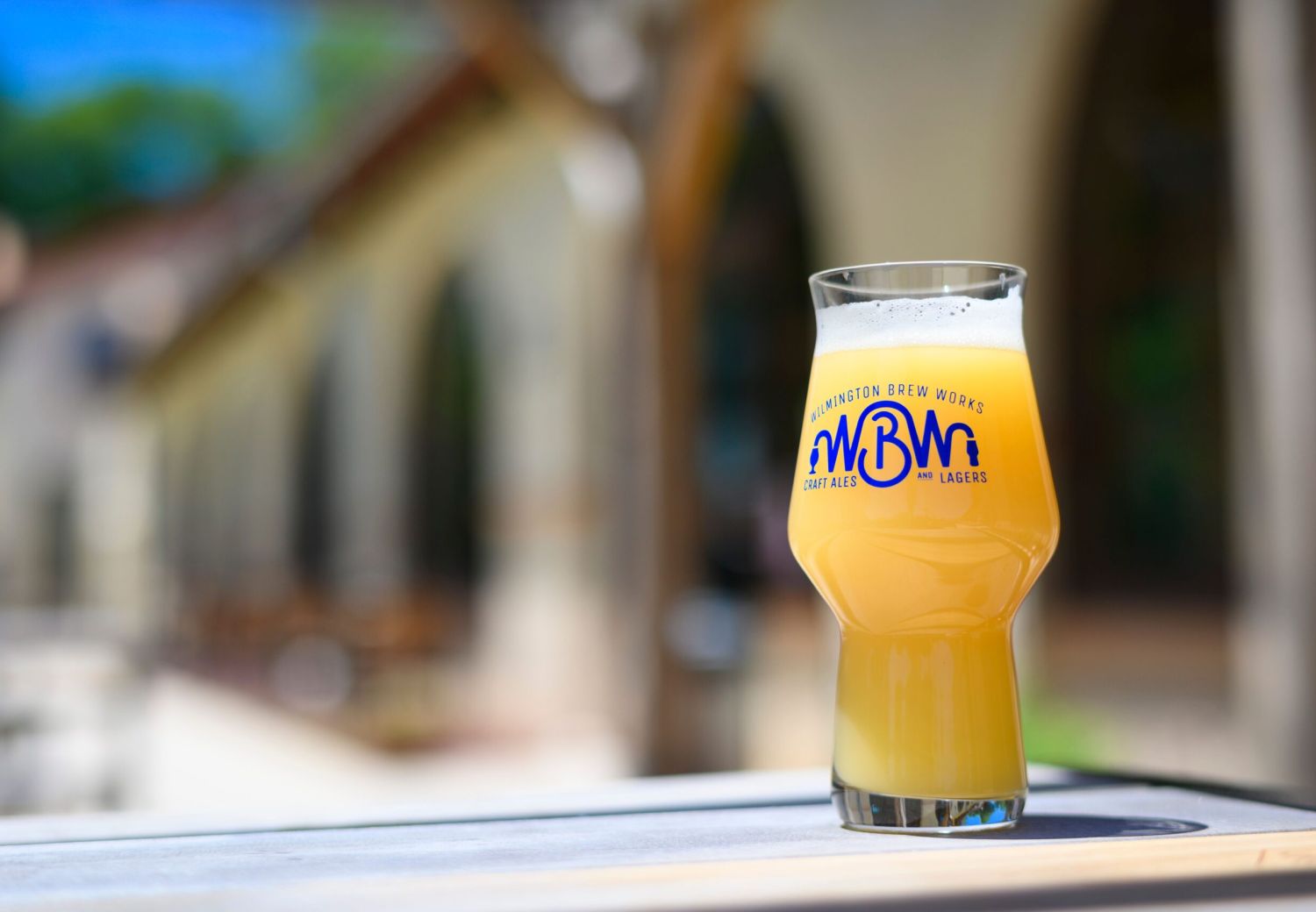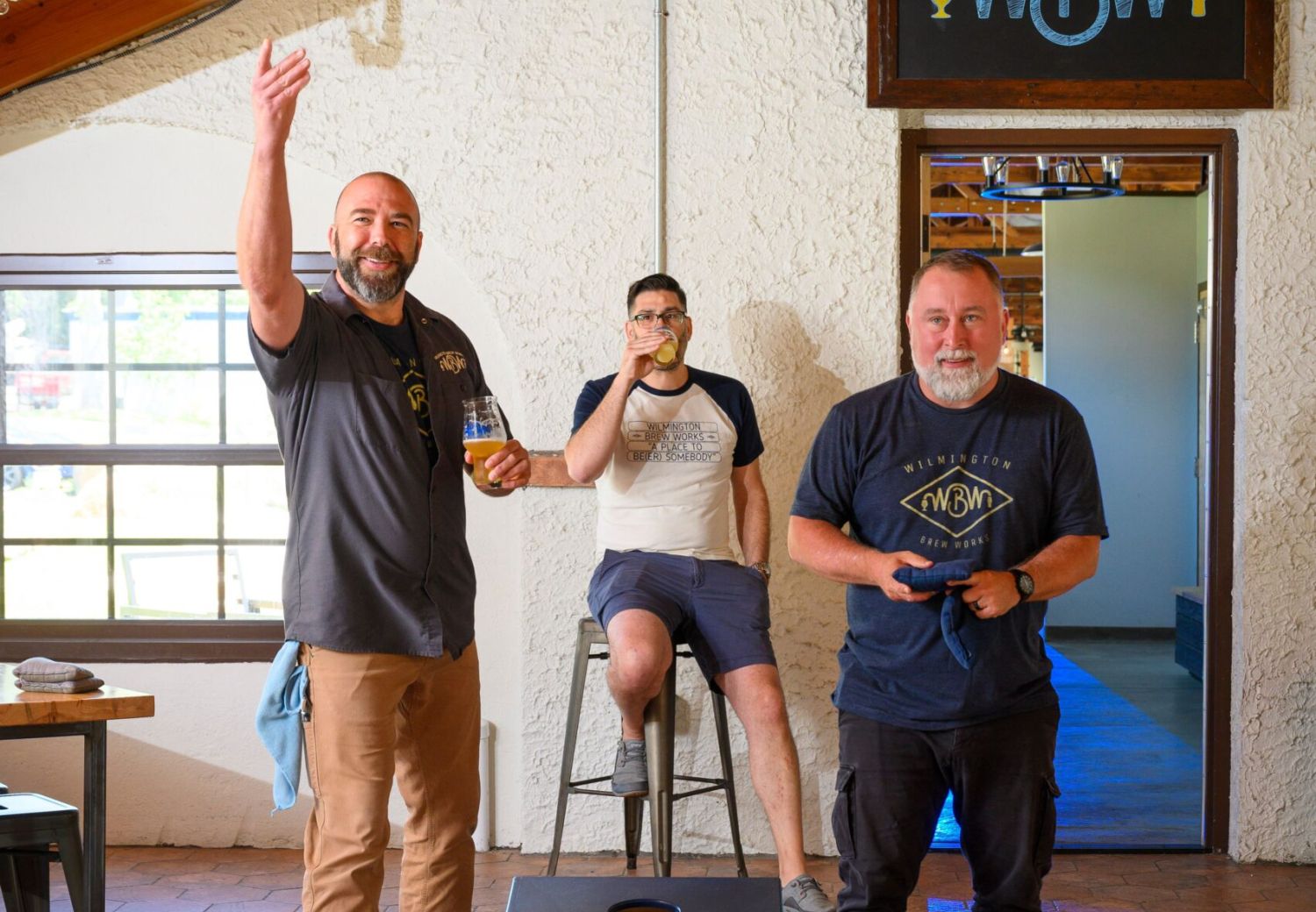Wilmington Brew Works
Wilmington Brew Works
Wilmington Brew Works enters Third Year with Glasses Raised
Earlier this year, as they were approaching just their second anniversary, CEO Craig Wensell, CFO Keith Hughes and VP of Marketing John Fusco of Wilmington Brew Works holed up in their expansive Miller Road location to discuss the state’s then-recently announced phased re-opening. Their navigation of the COVID-19 pandemic since then has been both successful and a testament to the partners’ collaboration and the strategic partnerships they have created along the way.
“We were almost dead in the water there for a little bit,” Hughes recalls. “There was a national shortage of crowlers and growlers, and there was nowhere to put the beer we were making. It seemed like every day there for a while, something would happen that had us trying to figure out how to keep the lights on.”
Throughout the pandemic, local breweries, along with the Delaware Brewers’ Guild, have worked to keep breweries up to date with changing restrictions. They also have come together to help each other out when supplies have run short.
“We put out a call because we were very low on crowlers,” Wensell says. “And, lo and behold, Drew [Rutherford] from Stitch House reached out right away and helped us out.”
Pivoting quickly also helped.
“On the weekend of March 13, I was on the computer all weekend building a website to allow us to take online orders for pickup,” Fusco says. “We were able to launch that the day the government shut us down. At the end of that week, we could not believe how much business we had done.”
The three actually have been together for a long time, working as very early collaborating partners on Bellefonte Brewing Company. Fusco did the logo and design work for that, Hughes put the business plan together, and Wensell brewed the beer.
“Building a good team is very hard,” Hughes says. “[It is often important] to understand when not to get involved in something. We are all very Type A here, which is usually a tough situation to have, that many opinions. You have to respect the person and their role, which I think we do a good job with here.”
The combination of this niche community, great beer, a convenient location and a relaxed and inclusive atmosphere makes Wilmington Brew Works unique to the region.
Hughes and Fusco originally connected with Wensell as homebrewers.
“[Ed Mulvihill] at Peco’s Liquor told me there was someone I should meet who was creating great beer,” Hughes remembers. “I was involved early on with some of the financial parts of Bellefonte, and when this came around I was excited to be a part of it.”
The trio, Fusco says, developed their own design ethos for how they wanted to do everything. For example, he says, the naming convention for their brews.
“[That] came from the very first beer that we ever put out called Superfluous Nomenclature, Fusco says. “We wanted something
difficult to read, with long words that could introduce people to new vocabulary. We have a big list of weird words that we collect and try to match with each other.”
“Our most recent beer, Sartorial Absence, came from a podcast I was listening to about the history of clothing. The word ‘sartorial’ kept coming up and making me laugh. We then had Dave Sanchez [from Spaceboy Clothing] design our label for that, which was a lot of fun.”
Sartorial Absence also brought a bit of notoriety to Wilmington Brew Works with a Facebook post that was posed to look like Wensell was brewing beer without clothing. That, Wensell reassures, was “all staged.”
Wilmington Brew Works’ first collaboration had occurred when Wensell was approached by Herb Inden, Wilmington’s director of Planning and Development, with a conveniently located spot just off Interstate 95. The location had been empty for close to 20 years, Wensell says, and the city did an “incredible” job preparing it for the new brewery.
The building itself was created by Francis Irénée du Pont after he left the DuPont Company in 1917. The long, winding Spanish Mission style was unique for this region. Blueprints from some of du Pont’s many patents, which include the first steam-powered car, a liquid vending machine and a steam power plant, all hang inside the brewery.
Another of Wilmington Brew Works’ many collaborations, the on-site addition of La Pizzeria Metro, has arguably been the most valuable. Metro is one of the hottest restaurants in the city, and the Wilmington Brew Works trash cans typically are piled high with pizza boxes at the end of each night.
“I spent four months in Naples,” Fusco says, “and Metro and Pizzeria Vetri in Philly are the only things close.”
Wensell calls this collaboration “perfect from the start” as the Wilmington Brew Works team never sought to be a brewpub or enter the actual restaurant business.
Wilmington Brew Works attributes a lot of its pre-pandemic success to the multipurpose Alamo Room, which is physically connected to La Pizzeria Metro. The Alamo has hosted parties, concerts, plays, games and even yoga.
“We’ve had so many people tell us, ‘We’d never been here before. This place is wonderful. We’re coming back,’” Hughes says. “Or we’d get calls on Monday from people who were at parties wanting to schedule their own.”
Wensell notes that among the range of activities taking place in the Alamo Room, one in particular has been a specialty. Spoken word, he says, is a niche they have been able to fill.
“We’ve had comedy and Delaware Shakespeare,” he says. “The [Delaware Poet Laureates], the Twin Poets, played back there and were fantastic. And these things have consistently drawn a great response to the point that things sell out, and people call and harass me on the phone. They want to speak with the manager.”
The combination of this niche community, great beer, a convenient location and a relaxed and inclusive atmosphere makes Wilmington Brew Works unique to the region. Wensell notes that one of their most surprising demographics has been parents of young children and mothers with babies who are looking for somewhere they can be comfortable.
“We have these long tables because we want to encourage people to come, hang out and meet strangers,” he says. “So many people have met friends here for the first time.”
The hyper-focused local approach has been a win for Wilmington Brew Works, creating a microcosm of a small town in its offerings.
“It’s allowed us to really focus on what we do – it’s like we are not really competing with other breweries so much as ourselves,” Wensell says. “Ultimately, the COVID shutdown was a fantastic opportunity for us.”
“Our team looked at it as the excuse we needed to take the steps we were going to have to make anyway.”

